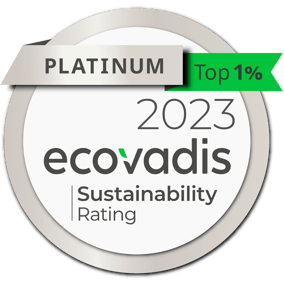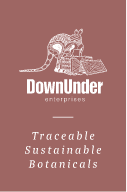Platinum EcoVadis rating achieved
We brought in EcoVadis to conduct an independent assessment of our Sustainability footprint. Having this third-party audit of our program helps us track our progress towards the UN Sustainable Development Goals and our UN Global Compact commitments.
In the first year, we were recognized with a Bronze rating, just one point off a Silver. We set a target for 2021 to hit Silver and a stretch goal for Gold. Our plan included establishing a couple of new policies, implementing some supporting programs, expanding our Sustainability KPIs, and incorporating these into our team members' personal objectives.
Our team's hard work paid off.
In 2023 we were awarded a Platinum Sustainability rating by EcoVadis for three consecutive years. This places Down Under Enterprises in the top 1 percent of sustainable businesses audited by EcoVadis globally.

Saving Water and preventing runoff
Tea Tree crops are water-efficient thanks to their long taproots which can be more than 20m (65 feet) deep! The role of irrigation at Buhlambar (our Tea Tree Farm) is as a safety measure, to make sure our product is consistent from year to year – to meet our customers’ supply requirements.
Runoff from agricultural land (including soil nutrients and sediment), is a major threat to waterways that can be toxic to humans, livestock, and marine life.
To counter these challenges, we built two dams at Buhlambar in a closed-loop system. When irrigation activities are required, irrigation flows from the paddocks to drains, then to a common tail waste dam where the water is settled and naturally filtered. It is then returned to the central dam for uptake by the irrigation system again.
Turning waste into new products
After we distill the oil from the harvested Tea Tree leaves, we are left with "spent" biomass. This waste from the Tea Tree Oil production process at our farm is then composted with other local organic waste materials to create a wonderful and rich fertilizer product. We then spread this over our new growth to prime the land for the new year's growth.
And it’s all 100% organic!
In addition to the spent biomass, there is one other waste product from our Essential Oil production process: the wastewater produced from the condensation of steam after passing through the biomass. This distillate, in turn, becomes our aromatic hydrosols!
Hydrosols have an excellent sustainability profile, contain many water soluble plant components, and carry some of the fragrance and therapeutic properties of the plant.
100% Renewable Energy
Burning coal for energy releases large amounts of pollution, is damaging to health, and contributes to climate change. Traditional Essential Oil Distillation relied heavily on fossil fuels (coal, diesel, oil) as an energy source.
We set KPI’s to reduce our greenhouse gas emissions in our production process and transition our farm equipment to solar power where possible. These actions are reducing our reliance on diesel fuel and thereby reducing carbon emissions.
We use 100% renewable energy for our warehouse and farm facilities, which also powers some of our farm equipment. We use 100% renewable energy at our offices as well. These activities directly reduce our carbon emissions and carbon footprint as a business - which we monitor as an annual KPI. This helps us steer a sustainable standard for our industry, and aligns us with the carbon emissions targets of our customers and keeps Australian Agribusiness in Essential Oils competitive in a global market.
Only 100% Renewable Electricity is employed at our farm, warehouse, and office.
Socio-Ethical Policies
As a female-founded and owned business, we have always had an inclusive company culture.
More recently, we documented this philosophy in formal policies. These policies include formal Work-from-Home, Bullying and Harassment, and Anti-Discrimination, to name only a few. As these policies adhere to the UN Global Compact and UN Global Sustainable Development Goals, it helps us align with standards globally.
Rewilding our farmland
As we have been returning much of our farm's land to a more natural state, the diversity of our local wildlife is growing. Native Australian wildlife is returning to Buhlambar Farm and thriving.
Within a 1km radius of the farm, we have over 50 different species of wildlife including koalas and a variety of birds such as Rosellas, Lorikeets, and Magpies. The Koala Corridor we planted since 2018 provides access for koalas to cross between habitats to encourage their repopulation.
Koala Conservation Project
Our Koala conservation work has been an ongoing team project that’s very close to our hearts. The natural habitat of koalas has been at risk due to many factors.
The devastating effects of the 2019-2020 Australian bushfires resulted in a significant decimation of their ecosystem all along the East coast of Australia. We’ve been planting Eucalyptus trees along the boundary of our farm to form a Koala corridor to provide safe passage and a food source to support the local koala population. Eucalyptus trees grow relatively quickly, which is great for our ever-hungry koalas.
Recycled Packaging
Essential Oils have been traditionally exported in large plastic drums. We wanted to find a sustainable alternative to minimise our footprint. Plastic pollution is a major global issue. Plastic takes more than 400 years to degrade. Most plastic ever produced – EVER – still exists in some form.
In the Essential Oil Industry, plastic HDPE drums are commonly used to transport the product. However, only a small amount is recycled and it is invariably “downcycled”. We had to find an alternative.
Following an extensive investigation and long term storage trials, we changed from using plastic HDPE to aluminum for our essential oils. Whereas only ~15% of all plastic is recycled, approximately 85% of aluminum is recycled. Best of all, the recycling process is less energy intensive than new aluminum - and it can be recycled into another high quality aluminum flask.
Environmentally-friendly farming
Synthetic chemicals are a common way of life in agriculture. However, these chemicals often deplete the soil of nutrients and beneficial microbes and even beneficial worms. We obtained this agricultural implement called Lillistons, through a generous customer grant, to gently cultivate the very top layer of soil, mix our compost with the native soil, and provide a “mechanical weeding” of surface weeds.
Watch the video to see our mechanical weeder in action.
Electric Farm Equipment
Our Electric Quad (ATV) bike allows us to conduct farm activities without the use of a diesel-fuelled tractor – again powered by 100% renewable energy. The Electric Zero Radius Mower, similar to the Electric Quad Bike, uses 100% renewable energy to maintain much of the grassed areas of the farm. This eliminates the use of diesel and petrol, reduces our GHG emissions footprint, and even makes it easier for our staff to maintain our farm - and farm equipment.
Drone Technology
Australian farmers are turning to drone monitoring systems to increase the likelihood of a successful crop and positively impact the consistency of supply.
We are starting down the path of drone technology on our farm to capture and analyze spectral imaging of our trees. This technology is able to monitor plant health and viability, long before issues become visible to the naked eye. This new imaging analysis is the really exciting part of adopting drones for our farming activities.
We are implementing a “proactive farm management” approach on our farm – combining this spectral monitoring with our weather station and soil analysis probes to keep our trees happy and healthy. And, of course, all powered with 100% renewable energy.
Farming is certainly moving into the 21st century.

